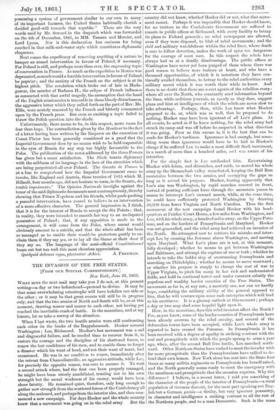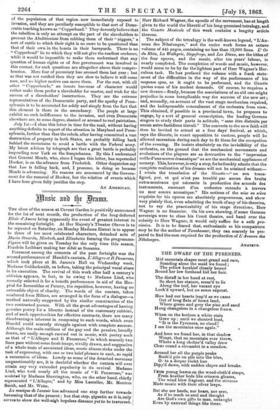THE INVASION OF THE FREE STATES. {FROM OUR SPECIAL CORRESPONDENT.]
New York, June 29, 1863.
WHAT news the next mail may take you I do not, at this present writing—a day or two beforehand—pretend to divine. It may be that some overwhelming catastrophe will have befallen one side or the other ; or it may be that great events will still be in progress only, and that the two armies of North and South will be, as at this moment, drawing nearer and nearer to each other, not having yet reached the inevitable crash of battle. In the meantime, and at my leisure, let us take a survey of the situation.
When I last wrote, the two hostile armies were still confronting each other On the banks of the Rappahannock. Hooker covered Washington ; Lee, Richmond. Hooker's last movement was a sad and disgraceful failure, and he needed time to recover from it, to restore the courage and the discipline of his shattered forces, to renew the lost confidence of his men, and to enable them to forget a disaster which his want of head, and not their want of heart, had occasioned. He was in no condition to renew, immediately after the retreat from Chancellorsville, an aggressive attitude, while Lee, for precisely the opposite reason, was sure to assume it. To wait a second attack where, had the first one been properly managed, he might have been utterly annihilated, trusting not to his own strength but the moral weakness of his enemy, would have been sheer fatuity. He remained quiet, therefore, only long enough to gather new strength from the scattered forces of the Confederacy all along the seaboard, and perhaps from the interior also, and then com- menced a new campaign. For days Hooker and the whole country knew that a movement was going on in the rebel army. But the
country did not know, whethef Hooker did or not, what that move- ment meant. Perhaps it was impossible that Hooker should know, for no traitors to the Confederate Government are suffered to remain in public offices at Richmond, with every facility to betray its plans to Federal generals ; no rebel newspapers are allowed, even if they were disposed, to blab of rebel movements; and the civil and military watchfulness within the rebel lines, where death is sure to follow detection, makes the work of spies too dangerous for the courage of most men. In this respect the rebels have always had us at a deadly disadvantage. The public offices at Washington have never yet been purged of those whom there was good reason to believe were traitors at heart, and who have a thousand opportunities, of which it is notorious they have con- tinually availed themselves, to betray to the rebel authorities every military secret which it was worth their while to know. And there is no doubt that there are secret agents of the rebellion every- where all over the North, who constantly send information beyond the lines, while seditious journals, as openly as they dare, suggest plans and hint at intelligence of which the rebels are never slow to take advantage. Perhaps, then, while Lee knew what Hooker proposed to do, or, which was as well, that he proposed to do nothing, Hooker may have been ignorant of all Lee's plans. At all events, he acted as if he knew nothing, for the rebel army had struck its camp and was off before he suspected in what direction it was going. Poor as this excuse is, it is the best that can be made for Hooker's tardiness. Ignorance is bad enough, but some- thing IMES than ignorance would have to be laid to Hooker's charge if he suffered Lee to make a most difficult flank movement, in a march of more than a hundred miles, and was aware of his intention.
For the simple fact is Lee outflanked him. Entertaining Hooker with feints, and skirmishes, and raids, he moved his whole army up the Shenandoah valley unmolested, keeping the Bull Run mountains between the two armies, and occupying the gaps so long as it served his purpose. Hooker, fearing apparently that Lee's aim was Washington, by rapid marches covered its front, instead of pouring sufficient force through the mountain passes in season to intercept Lee's onward march, while, at the same time, he could have sufficiently protected Washington" by drawing 50,000 from lower Virginia and North Carolina. Thus the first movement of the new campaign found Hooker with his head- quarters at Fairfax Court House, a few miles from Washington, and Lee, with his whole army, a hundred miles away, on the Upper Poto- mac, and on the borders of Pennsylvania and Maryland. Hooker was out-generalled, and the rebel army had achieved an invasion of the North. He attempted now to retrieve his mistake and inter- cept Lee by crossing the Potomac above Washington, and moving upon Maryland. What Lee's plans are is not, at this moment, fully developed ; whether he means to get between Washington and Baltimore, and attempt the capture of one or both ; whether he intends to take the bolder step of overrunning Pennsylvania and marching on Philadelphia ; whether he means to move westward ; or whether his purpose is simply to change the seat of war to Upper Virginia, to pitch his camp in her rich and undeviustated fields, and hold in continual terror and under constant subsidy the populous and wealthy border counties of the Free States. The movement so far is, at any rate, a masterly one, nor can we hardly hope, considering the military ability of the general opposed to him, that he will venture upon some rash enterprise which will lead to his overthrow. It is a gloomy outlook at this moment ; perhaps a day or two may shed some hopeful light upon it.
How, in the meantime, does this rebel invasion affect the North? For, as you know, some of the border counties of Pennsylvania have been already overrun by the rebel cavalry, and several of the defenceless towns have been occupied, while Lee's whole army is reported to have crossed the Potomac. In Pennsylvania it has been received with a degree of apathy in striking contrast with the zeal and promptitude with which the people sprang to arms a year ago, when, after the second Bull Run battle, Lee marched north- ward. Other Northern States have rushed to meet the invader with far more promptitude than the Pennsylvanians have rallied to de- fend their own homes. New York alone has sent into the State four times as many militia regiments as Pennsylvania has herself raised, and the North generally seems ready to meet the emergency with the manliness and promptitude that the occasion requires. Why this difference? I believe, in a recent letter, I told you something of the character of the people of the interior of Pennsylvania—a rural population of German descent, for the most part speaking not Eng- lish but a German patois—a thrifty, but very ignorant peasantry, in character and intelligenes a striking contrast to all the rest of the Northern people, and to a man Democrats. Such is the mass of the population of that region. now immediately exposed to invasion, and they are peculiarly susceptible to that sort of Demo- cratic teaching known as "Copperhead." They devoutlybelieve that the rebellion is only an attempt on the part of the slaveholders to prevent the Abolitionists from robbing them of their "niggers," a sort of cattle to which their right is no more to be questioned than that of their own in the beasts in their barnyards. There is no "Copperhead" lie to which they will not give the readiest credence, while it would be impossible to make them understand that any question of human rights or of free government was involved in this contest, for such questions are altogether above their compre- hension. Mere fear of pecuniary loss aroused them last year ; but as that was not verified then they are slow to believe it will come now, and no higher motive can move them. For the rest, with all other "Copperheads," an innate baseness of character would rather make them prefer a slaveholder for master, and wish for the success of a slaveholders' insurrection. They are the extreme representatives of the Democratic party, and the apathy of Penn- sylvania is to be accounted for solely and simply from the fact that this element is there in the ascendancy. The people at large exhibit no such indifference to the invasion, and even Democrats elsewhere arc, to some degree, shamed or aroused to real patriotism.
July lst.—I close this letter in time for the mail, without having anything definite to report of the situation in Maryland and Penn- sylvania, farther than that the rebels, after having committed a vast destruction of property in both States, are probably falling back behind the mountains to avoid a battle with the Federal army. My latest advices by telegraph are that a great battle is probably impending near York on the Susquehanna. By this I understand that General Meade, who, since I began this letter, has superseded Hooker, is on the advance from Frederick. Other despatches say that Lee is falling back, and, I presume, is doing so because Meade is advancing. No reasons are announced by the Govern- ment for the removal of Hooker, but the relation of events which I have here given fully justifies the step.
AN AMERICAN.































 Previous page
Previous page